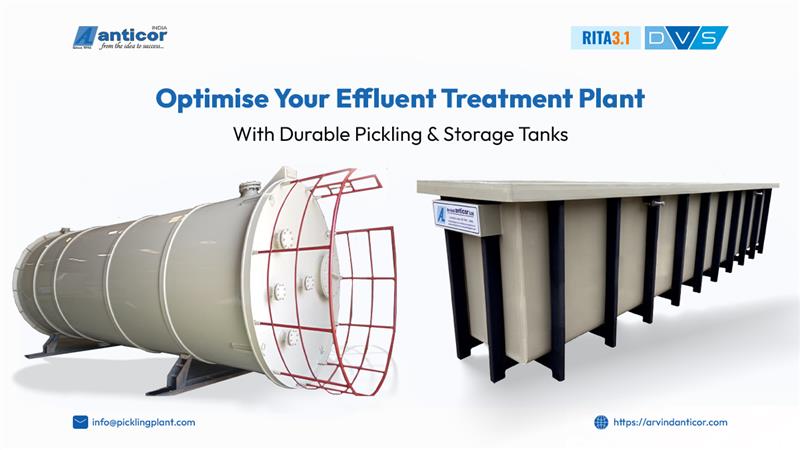

Surface treatment industries like pickling, galvanizing, and electroplating rely heavily on chemicals to prepare and protect metal surfaces. While essential for product quality, these processes produce highly contaminated wastewater often containing acids, heavy metals, and other hazardous by-products.
If not properly treated, this wastewater can lead to environmental degradation, health hazards, and non-compliance with pollution control norms. This is where an Effluent Treatment Plant (ETP system) becomes vital. It serves as the first line of defense in a responsible and compliant wastewater treatment strategy.
What is an Effluent Treatment Plant (ETP System)?
An Effluent Treatment Plant (ETP) is a specialized system designed to treat wastewater generated from chemical-intensive processes like pickling, galvanizing, electroplating, and other surface treatment operations. These plants remove contaminants such as suspended solids, heavy metals, toxic chemicals, and acidic compounds from wastewater before it is either safely discharged or reused.
In essence, an ETP system acts as the central unit in a facility’s wastewater treatment infrastructure, ensuring that all effluent is brought within permissible environmental limits. Whether it’s handling acidic rinse water or sludge-heavy discharge, ETPs are essential for industries aiming to operate sustainably and comply with pollution control norms.
How Does an ETP System Work?
An Effluent Treatment Plant (ETP system) functions through a systematic, multi-stage process designed to purify contaminated water. These stages ensure that wastewater from surface treatment processes like pickling or galvanizing is treated thoroughly before discharge or reuse.
The key stages in an ETP system include:
- Primary Treatment
Removal of suspended solids, oil, and grease through screening, settling, and sedimentation.
- Secondary Treatment
Biological treatment using aeration or activated sludge to break down organic pollutants.
- Tertiary Treatment
Final polishing stage includes filtration, chemical dosing, pH neutralization, and disinfection to meet environmental discharge norms.
Throughout these stages, the system relies on corrosion-resistant tanks, chemical dosing units, and fluid handling equipment. Materials like PP, FRP, and HDPE are essential to withstand harsh chemicals and ensure long-lasting performance in demanding wastewater treatment environments.
Why Are ETP Systems Critical for Surface Treatment Plants?
Surface treatment operations such as pickling, galvanizing, and electroplating generate high volumes of effluent containing acids, metal ions, and chemical residues. Without proper treatment, this wastewater can contaminate local ecosystems, corrode infrastructure, and expose workers to health risks.
An Effluent Treatment Plant (ETP system) plays a vital role in managing this challenge. It ensures that industrial discharge complies with CPCB and SPCB environmental regulations, while also enabling wastewater recycling and reducing the plant’s freshwater consumption.
By implementing an ETP system, surface treatment plants can:
- Maintain regulatory compliance and avoid penalties
- Protect soil and water resources from toxic contamination
- Enable safe reuse of water for rinsing and auxiliary operations
- Promote a safer, cleaner, and more sustainable work environment
In short, an ETP system is a core requirement for responsible wastewater treatment in any surface finishing facility.
Arvind Anticor’s Role: Tanks That Power ETP Efficiency
At Arvind Anticor, we play a vital supporting role in the performance and longevity of Effluent Treatment Plants used across surface treatment industries. Our tanks and components are designed specifically to handle the chemical and structural challenges that ETP systems face daily.
We offer:
- Chemical storage tanks made from PP, FRP, and HDPE
- Neutralization and reaction tanks engineered for corrosive effluent balancing
- Sludge holding and settling tanks built for long-term resistance to wear and chemical exposure
Manufactured using DVS-compliant welding and RITA 3.1 software, our tanks are leak-proof, corrosion-resistant, and optimized for seamless integration in wastewater treatment systems. Whether it’s for acid neutralization, chemical dosing, or sludge collection, Arvind Anticor provides durable infrastructure that ensures your ETP system runs reliably and safely.
Conclusion
An Effluent Treatment Plant (ETP system) is more than just a regulatory requirement .It’s the foundation of a responsible and sustainable surface treatment operation. As environmental regulations tighten and industry standards evolve, efficient wastewater treatment is no longer optional, but essential.
With Arvind Anticor’s corrosion-resistant PP, FRP, and HDPE tanks integrated into your ETP system, you gain long-term reliability, safety, and compliance. From acid neutralization to sludge handling, our tanks are engineered to withstand the toughest chemical environments and keep your operations running efficiently.
Let’s Connect
Contact Us
We are live 24/7 and reply within 48 hours.
Get in Touch
-
-
-
Address
Survey No.584/1+2 – C,Nr. Akshar Industrial Estate Mahemdabad Highway Road,Vatva Ahmedabad-382445, Gujarat, India.